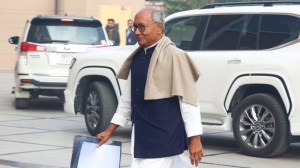Not by chance
The main reason for the encounter cop8217;s rise was the inability of the judicial system to punish criminals

These are hard times for the 8216;encounter8217; specialists. A leading practitioner was shot dead by his own clandestine business partner in Gurgaon on the outskirts of Delhi. Three of his counterparts in Mumbai are under suspension for possessing assets disproportionate to their incomes or for deaths in custody. Another is under a cloud in the Khwaja Yunus disappearance case.
In better days, they were the darlings of the urban middle class in whose perception they assumed larger-than-life proportions. Popular Hindi cinema even went to the extent of glorifying their exploits on screen. All this adulation made them reckless, leading them later to the inevitable denouement.
The same public that once looked up to them for deliverance from the dreaded world of extortionists and contract killers now understood that they had turned into criminals in uniform. The same police leadership 8212; that out of desperation leaned heavily on these specialists for relief from the public pressure at its inability to subjugate the underworld 8212; now tried to distance itself from these men.
Take the case of Daya Nayak, an Udipi restaurant worker, who was recruited as a sub-inspector of police and posted to Mumbai. His derring-do soon earned him a slot among the encounter specialists. Name and fame followed. The film fraternity, equating money and fame with status, began inviting him to dinner parties, where the commissioner of police was also a guest. This misplaced egalitarianism emboldened Naik to accuse his boss of corruption when he himself was caught for acquiring assets totally disproportionate to his known sources of income. This only shows that these specialists soon outgrow their boots.
It is now an accepted fact that encounter specialists get to know the movements of underworld operatives from rival gangs, who make use of the specialists to eliminate competition. It is also suspected that complaints of extortion increase when specialists head special units meant for curbing this specific crime!
While discussing corruption with this writer some time in 1988, the commissioner of the London Metropolitan Police, Sir Peter Imbert later Lord Imbert, confided that Scotland Yard too had a problem, mainly with the special squads. This can be understood when one considers that these men, who are specially chosen for their daring and extraordinary initiative, enjoy a measure of freedom that is denied to their colleagues. Their unconventional hours of work and the risks they take give them some form of licence, which is most often misused.
An 8216;encounter8217; would normally connote an unexpected meeting of two people or groups of people, usually adversaries. Can there be specialists who specialise in unexpected confrontations? Hardly likely. The term 8216;encounter specialists8217;, therefore, is a misnomer that doesn8217;t sound right but assuages the fears of the urban middle class.
Encounter specialists came to prominence in the big metropolitan cities of Mumbai and Delhi in the last decade or two. The principal reason for their rise was the increasing inability of the judicial system to punish and put away desperate criminals owing allegiance to the underworld. The length of time taken for cases to come up for hearing in the court, together with the increasing corruption in the investigation, prosecution and trial machinery, as well as in the prison administration, had taken its inevitable toll.
The criminal underworld thrives when the political class and the police join hands to allow it space for its activities in exchange for money and muscle. The public, the middle class in particular, feels threatened when extortions or kidnappings and abductions become common and when gangland murders increase.
In this scenario, enters the encounter specialist with his macho image and the guns under his belt. He is a junior officer, a sub-inspector or an inspector, with a little more dash and courage and bravado than other colleagues of his. A desperate leadership unwittingly leans on him to rid itself of public condemnation and criticism for not being able to tackle the criminals.
Basically, a leadership that encourages the specialists has opted for short cuts when in fact it should have tackled the real problem of corruption and connivance and lobbied for quicker dispensation of justice. The inroads of corruption in the higher echelons of leadership have contributed in no small measure to the steady deterioration of the security climate not only in the big cities but also in smaller cities and towns.
When the leadership of the police is corrupt, the contagion spreads rapidly. There is more emphasis on earning quick and easy money than on preventing or detecting crime. Lawlessness proliferates, the underworld spreads its tentacles and the public is naturally alarmed. Since sincere and professional policing has been temporarily shelved, other remedies have to be found to pacify the people. Thus, the encounter specialist saves a corrupt administration of many blushes.
If the phenomenon of the encounter specialist is to be eliminated, the judicial system needs to be put back on rails. A change is already noticeable in the higher judiciary after the Jessica Lal case. Quicker and firmer decisions have ensured a measure of fear that was absent, particularly among the moneyed classes.
Now, it is the turn of the police to change. The rule of law must be upheld, and no interference with the investigation of crime should be tolerated, however important or influential the culprit. For this, the standard of professionalism needs to be raised. The corrupt and inefficient should not be allowed to rise to the top and in any case they should not be entrusted with cutting-edge jobs involving public interaction.
Station house officers should be held accountable for crime and criminals in their jurisdiction. Under no circumstances should they be allowed to shift the onus of responsibility to specialists, who will not be required if everyone down the line does his or her expected duty.
The writer is a former director general of Punjab Police
expressexpressindia.com
- 01
- 02
- 03
- 04
- 05































